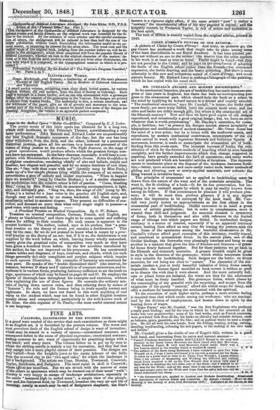MUSIC.
Sortgein the Ballad Opera "Robin Goodfellow." Composed by E. J. Loder.
The pretty music of this little opera has obtained for it a long run, which still' continues, at the Princess's Theatre, notwithstanding a very lame 'performance. John Barnett and Edward Loder are unquestionably the best English dramatic composers of the day; but the one has long since' withdrawn from the field, and the other,, induced by a permanent theatrical position, gives all his services to a house not possessed of the means of doing justice to his works. The Night Dancers, on the stage of a great operahouse, would produce effects which the greatest foreign mas- ters have not surpaesed. In the fairy choruses, especially, it will bear a com- parison with Mendelssohn's Midsummer Night's Dream. Robin Goodfellow is of slighter construction consisting chiefly of airs and ballads, simple and familiar, but elegant and graceful, and by no means destitute of new ideas. The air, " Say, wilt thou roam with me " (prettily sung by Miss Poole,) made up of a lbw simple phrases lying within the compass of an octave, is nevertheless a gem of melody and tender expression. " When in happier days we warider'd," (sung by Charles Brabam,) is of a similar character: the modulation into the relative minor is full of passion. " Come, blushing May," (sung by Mrs. Weiss,) with its murmuring accompaniment, is light, airy, and delicately gay. " Sing we, then, the songs of old," (sung by Mr. Weiss,) is a ballad for a bass voice in the genuine old English style, and, though easy and natural, by no means hacknied. All these songs are excellently, suited to amateur singers. They present no difficulties of exe- cution; and demand no more than what every singer ought to possess-a good voice, with taste and feeling. —


























 Previous page
Previous page